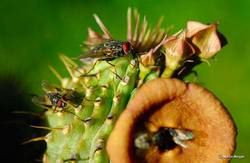 Hoodia gordonii, a CITES-listed cactus, has been detected in health supplements mailed to Australia © Martin Heigan / Creative Commons Australia, June 2013—Australia's federal department of Sustainability, Environment, Water, Population and Communities has warned consumers against taking up offers via the internet for importing sports and other health supplements containing endangered plant and animal species.
Hoodia gordonii, a CITES-listed cactus, has been detected in health supplements mailed to Australia © Martin Heigan / Creative Commons Australia, June 2013—Australia's federal department of Sustainability, Environment, Water, Population and Communities has warned consumers against taking up offers via the internet for importing sports and other health supplements containing endangered plant and animal species.
The department is particularly concerned by recent advertising for free bottles of Max Thermo Burn capsules from North America.
Max Thermo Burn capsules contain Hoodia gordonii. Hoodia gordonii is a cactus-like plant and is listed as endangered under the Convention on International Trade in Endangered Species of Wild Fauna and Flora (CITES).
From 1 July 2012 to 30 May 2013, the Australian Customs and Border Protection Service detected 727 importations of hoodia in International Mail.
Permits are required to legally import products containing Hoodia gordonii including through the post. Consumers should be warned that Max Thermo Burn products imported without appropriate permits will be seized at the border.
More generally, the department encourages consumers to take steps to fully understand what they are purchasing on the internet, including whether the ingredients may include threatened wildlife species and if it is legal to bring into Australia.
Australia became a signatory to CITES in 1976. CITES protects and regulates species threatened through international trade.
Under Australia's national environment law it is illegal to import products containing any CITES listed specimens without the appropriate approvals. A permit from the exporting country is required and an import permit must also be applied for from the Australian federal environment department. Permits must be in place prior to the arrival of such products in Australia.
The department is liaising with authorities in the United States in relation to the recent seizures of Max Thermo Burn.
Under the national environment law there are strong penalties for wildlife trade offences.
For more information on wildlife trade and CITES go to www.environment.gov.au/travel or contact the department via [email protected].